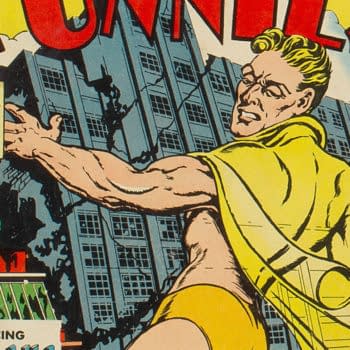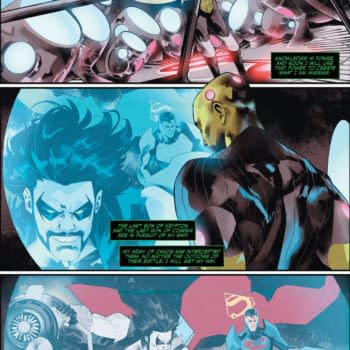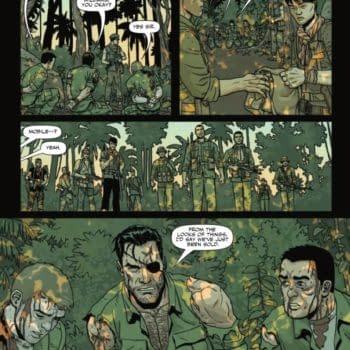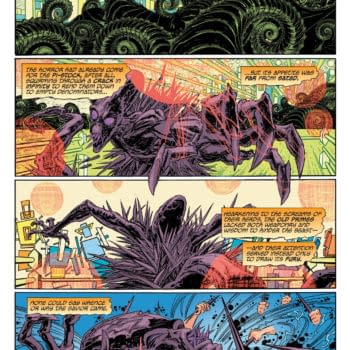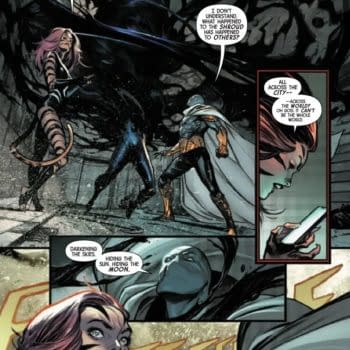Posted in: Comics, Recent Updates | Tagged: Comics, comics scripting, entertainment, glen fabry, global frequency, warren ellis
From Strip To Script – Global Frequency #2 And 'Rescue Fiction'
By Josh Hechinger
Welcome to From Strip to Script, where I take a page of finished comic art and try to derive a script from it.
I've been on an XCOM kick (again), recently. For an IRL pacifist, I do seem to endlessly return to military-sci-fi games as comfort food: XCOM, sorta-kinda Resident Evil, Mass Effect, Metal Gear. Of course, a lot of the appeal of those last two, to me, are their varying degrees of being able to successfully complete objectives with non-violence, either by, say, talking down a rogue biotic (ME), or shooting people in the dome with a tranq dart and extracting them from the battlefield with a balloon (MG).
XCOM is pretty rigid in terms of "everything is solved by shooting aliens" approach, but even then…I never approach missions with the idea of killing all the aliens, I approach it with the idea of keeping all my units alive in a fight; if I could do it non-lethally, that'd be all the better. Combine that with trying to keep global panic down, or how I'll often bite off more than I can chew on the Terror Missions (where you have to directly rescue civilians)…well, it's maybe wishful thinking or willful ignorance, but I always try to approach XCOM as more of a rescue fiction game (and, y'know, if anyone ever wants to make a straight up tactical rescue fiction game with base management aspects, consider me a day-one sale).
"Rescue fiction" is a term I first encountered from Warren Ellis, specifically him talking about Global Frequency and the influence it took from Garry Anderson's work, like Thunderbirds. "Rescue fiction" is the idea that when something weird or dangerous is happening or about to happen, we (humanity) are saved from it not by some kind of extranormal outsider (think superhero), but by a team of human beings being inventive and clever to solve the crisis with science and technology.
I dunno, it's a nice genre, one frequently under-served in comics.
Now, that said, here's the issue of the rescue fiction comic where they go into the unknown and have a hell of a time not-dying while they put bullets into something monstrous; issue, by David Baron (colors), Warren Ellis (script), Glenn Fabry (pencils and inks), Michael Heisler (lettering), and Liam Sharp (additional inks).
PAGE ONE (SIX Panels)
P1. MARTIN, a middle-aged US general, stubs out a cigarette and makes a sour face. He's sitting at a metal table, in a darkened room.
– MARTIN No.
P2. An older GENERAL, standing, leans forward with both hands on the table.
– OLD GENERAL I'm sorry, Martin, but there is no 'no' here.
– MARTIN The Global Frequency is a civilian rescue operation run by a woman of questionable background and comprising a membership of a thousand and one freaks, geeks, and security risks.
P3. MARTIN, almost pouting, puts another cigarette in his mouth. The older GENERAL looms over him.
– OLD GENERAL Global Frequency has never once broken security. And they have specialties we don't.
– MARTIN I will not countenance sending a civilian operation into Big Wheel.
– MARTIN The answer is no.
P4. MARTIN, pauses before lighting his cigarette. His eyes narrow.
– OLD GENERAL (off) Will you countenance the subject breaching the Big Wheel compound?
– OLD GENERAL (off) That puts him about two hours away from greater Los Angeles.
P5. MARTIN deflates slightly, leaning his elbows on the table and smoking. The OLD GENERAL holds the Global Frequency phone out to him.
– OLD GENERAL (off) Press the button.
P6. MARTIN glumly considers the Global Frequency phone.
– TITLE Big Wheel
So, What'd We Learn?
– I have, of course, picked possibly the most visually-disinteresting page in the comic.
– But okay: let's start with the grid. Six panels, three tiers of two, not at all flashy, but it gives Ellis the space to have these two characters have an actual conversation, without overloading any individual panel with the chatter. Ellis (and Fabry) can probably pace a comic page in their sleep, even back then. It's a perfectly balanced narrative delivery system.
– There's some flash, of course: opening on a man stabbing a cigarette to death and just saying "no" is a door-kick of a cold open (to the cold open), and throwing the issue title as a floating logo across the bottom two panels isn't un-flashy.
– Those six square panels, and the "cold open, finishing on a title" nature of the scene…I'm not going to make anyone's monocle fly off by positing that there's mmmmaybe an influence from television going on there.
Lots of people write comics that are essentially movie/TV pitches, and indifference is the kindest emotion I can muster towards that. This doesn't quite feel like that (and yes, I'm aware of Global Frequency's two attempts at being TV), but rather it feels like Ellis trying to translate a filmed effect to a static medium. Nothing wrong with that.
– Cold opens are pre-credit scenes in movies/televisions. You can't really do a "pure" one in a comic like this, since, y'know, the cover is equivalent to the title credits, but having a coldish open to the story going into the issue's title is as close as you can get.
(You could maybe do a proper cold open in a webcomic. Although does the URL/title banner of a webcomic site is kind of the cover/title credits? I dunno, it's almost like these are different media with non-direct parallels or something, huh?)
– The "reintroduce the concept of the series every episode" exposition in panel 2 feels like it should be something I point to as a TV trick, but it's really just basic episodic storytelling, isn't it? Radio shows, television, comics, whatever whatever…it's just a good practice with any series where any episode can work as someone's intro
– I don't often rib the work I cover here, but oh, that phone. That comically oversized phone. That is just delightful, here in 2015.
Philly-based comic writer Josh Hechinger is a Cancer, and his blood type is A+. You can find him being a loquacious dope on Twitter.











